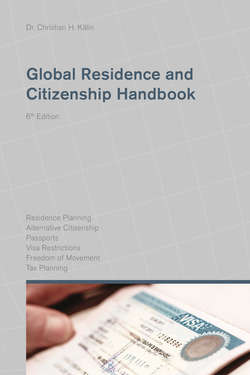Читать книгу Global Residence and Citizenship Handbook - Christian H. Kälin - Страница 35
На сайте Литреса книга снята с продажи.
Tax treaties
ОглавлениеBilateral agreements to avoid double taxation of persons resident in contractual states exist between many countries. Tax treaties delimit the tax-imposition rights between two countries and takes precedence over national legislation.
Whereas ownership of real estate abroad usually implies limited tax liability as a result of ownership of this property in the foreign country, a move abroad always affects tax residence and has considerable consequences on tax liabilities. Therefore, tax treaties can play an important factor in limiting such tax exposure.
Inheritance and gift taxes, which depend primarily on the testator’s last residence, may also be relevant. If a taxpayer who moves abroad has considerable income and assets, experience shows that the tax authorities concerned are particularly interested in the deceased’s last tax residence, as this leads in most countries to unrestricted tax liability on his or her estate. However, relatively few tax treaties concern inheritance and gift taxes; when speaking about double tax treaties, these generally relate to income and possibly wealth taxes only.
It may happen that two countries – according to their respective tax laws – simultaneously consider a particular taxpayer as fiscally resident and unrestrictedly tax liable. This could result in him being taxed on his global income and possibly also on his assets by both countries on the basis of their domestic tax regimes. But if a double taxation agreement exists between the two countries, it will help to determine where the taxpayer is fiscally resident and thus liable to unrestricted taxation, and which country is to merely apply restricted taxation – namely on any assets or income located within its territory.
Residence in one of the two contractual states is normally the precondition for the application of the relevant double taxation treaty and all claims on its protection. The treaty formulates precise rules to determine in which of the two contractual countries a taxpayer is deemed to be fiscally resident. They are known as tie-breaker rules and in the majority of double taxation treaties they follow the OECD model treaty.
Accordingly, most double taxation agreements define the country of tax residence as the place where the taxpayer has his main permanent home. If he has homes in both countries, the crucial point is where his personal and/or economic activities are centered. His habitual place of living is then in third place, and citizenship is considered only in fourth place. If the tax residence cannot be determined on the basis of these criteria, it is decided by mutual agreement between the countries concerned.
Double taxation agreements can also be useful in terminating tax residence in the country of emigration more quickly. If someone no longer wishes to count as a UK tax resident, for instance to avoid paying capital gains tax, UK domestic law stipulates that certain taxes apply up to five years even after moving abroad. But if they move the tax residence to a country which has a suitable double taxation agreement with the UK, such as Belgium, they can bypass such domestic tax regulations and may be able to reduce the period during which certain UK taxes still apply after a change of residence.
In the absence of a double taxation agreement between the previous and new country of residence (such as when moving for example from the Netherlands to Monaco), only the respective domestic fiscal regulations apply. These are, as a rule, stricter – at least for high-tax countries – i.e. it is more difficult to terminate one’s former tax residence if you directly move to a no-tax jurisdiction and there is no tax treaty. In order to avoid continuing to pay tax on one’s global income and possibly assets too, often all links to one’s former country of fiscal residence must be severed, and even then extended taxation may apply for some time after emigration.
